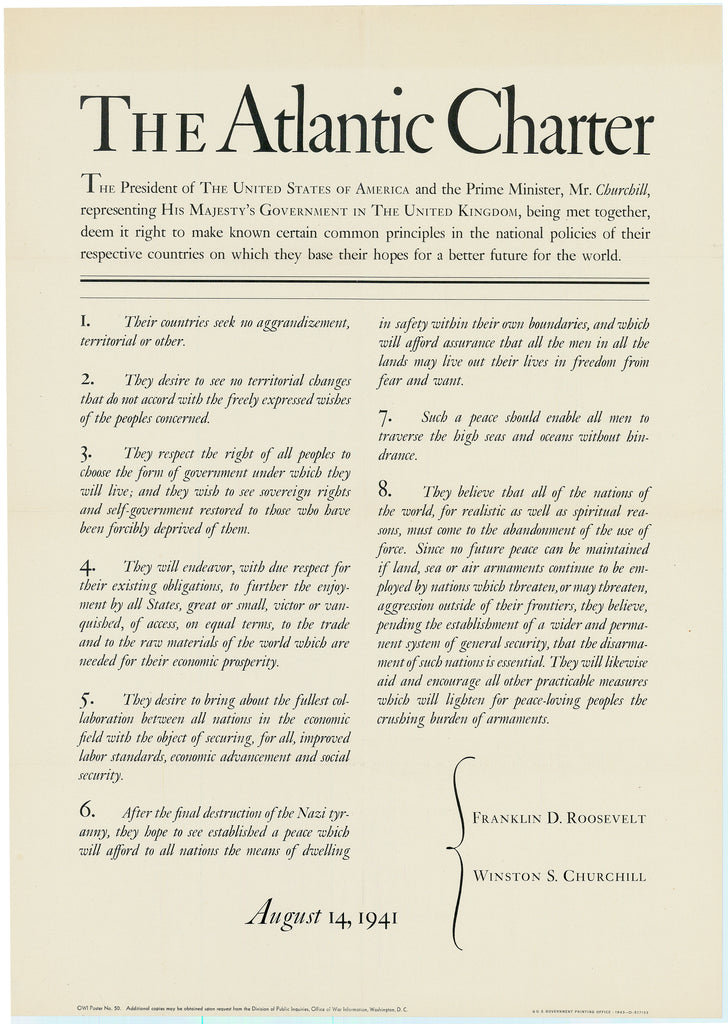- Title: The Atlantic Charter
- Author: Franklin D. Roosevelt & Winston S. Churchill (U.S. Gov. Printing Office)
- Date: 1943
- Condition: Excellent+
- Inches: 28 x 20 [Paper]
- Centimeters: 71.12 x 50.8 [Paper]
- Product ID: 308078
The Atlantic Charter was a joint declaration released by U.S. President Franklin D. Roosevelt and British Prime Minister Winston Churchill on August 14, 1941, immediately following their top secret meeting. The two met with utmost secrecy aboard the U.S.S. Augusta in Placentia Bay, Newfoundland, in response to the critical geopolitical situation; World War II raging, the Axis powers advance seemingly unstoppable, and American opinion vehemently opposed to involvement. It was the first time the two met in person, although they had frequently been in communication prior to the meeting. The United States was officially neutral and not involved in the fighting, but Roosevelt had been supplying Britain with war materials, first on a cash and carry basis, and then through the Lend-Lease Act, for nearly ten months. The Atlantic Charter provided a broad statement of U.S. and British solidarity.
Informally, the two men agreed to watch for an appropriate international incident to justify American entry into the war. Since the policy was issued as a statement, there was no formal, legal document called "Atlantic Charter" ever signed by both leaders. While the Atlantic Charter of August 1941 was not a binding treaty, it boldly reaffirmed the American commitment to democracy, pledged to overthrow Nazi tyranny, and outlined goals for the postwar world. , , its roots could be found in the principles outlined in Roosevelt's "Four Freedoms" speech, delivered on 6 January 1941, and its genesis was the founding document of the United Nations.
Eight “common principles” the United States and Great Britain would be committed to supporting in the postwar world were drafted. The Charter envisioned a postwar world that would be characterized by freer exchanges of trade, self-determination, disarmament, and collective security. Finally, the Charter ultimately did serve as an inspiration for colonial subjects throughout the Third World, from Algeria to Vietnam, as they fought for independence.
The broadside reads in full:
THE ATLANTIC CHARTER
The President of the United States of America and the Prime Minister, Mr. Churchill, representing His Majesty's Government in the United Kingdom, being met together, deem it right to make known certain common principles in the national policies of their respective countries on which they base their hopes for a better future for the world.
I
Their countries seek no aggrandizement, territorial or other.
II
They desire to see no territorial changes that do not accord with the freely expressed wishes of the peoples concerned.
III
They respect the right of all peoples to choose the form of government under which they will live; and they wish to see sovereign rights and self-government restored to those who have been forcibly deprived of them.
IV
They will endeavor, with due respect for their existing obligations, to further the enjoyment by all States, great or small, victor or vanquished, of access, on equal terms, to the trade and to the raw materials of the world which are needed for their economic prosperity.
V
They desire to bring about the fullest collaboration between all nations in the economic field with the object of securing, for all, improved labor standards, economic advancement and social security.
VI
After the final destruction of the Nazi tyranny, they hope to see established a peace which will afford to all nations the means of dwelling in safety within their own boundaries, and which will afford assurance that all the men in all the lands may live out their lives in freedom from fear and want.
VII
Such a peace should enable all men to traverse the high seas and oceans without hindrance.
VIII
They believe that all of the nations of the world, for realistic as well as spiritual reasons, must come to the abandonment of the use of force. Since no future peace can be maintained if land, sea or air armaments continue to be employed by nations which threaten, or may threaten, aggression outside of their frontiers, they believe, pending the establishment of a wider and permanent system of general security, that the disarmament of such nations is essential. They will likewise aid and encourage all other practicable measures which will lighten for peace-loving peoples the crushing burden of armaments.
14 August 1941 { Franklin D. Roosevelt | Winston S. Churchill


